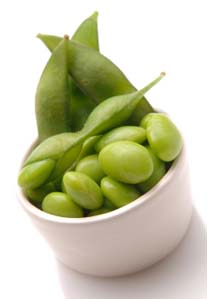Phytoestrogens

The prefix “phyto” means “plant” – phytoestrogens are estrogen-like substances found naturally in plant foods. These foods can have a significant hormone-balancing effect on a woman’s body.
Phytoestrogens can help protect against breast cancer (which is often associated with too much estrogen) and reduce menopausal symptoms, such as hot flashes (which are linked to not having enough estrogen). In countries such as Japan, where women eat a soy-based diet, breast cancer rates are much lower than in other countries, and the average age of menopause is 55, compared with 51 in the West.
Phytoestrogens may contain compounds that can inhibit uterine cancer, fibroids, and osteoporosis, and they can help reduce cholesterol levels, improving your cardiovascular system and protecting your heart.
The form of phytoestrogens that has the most positive effect on hormone balance is isoflavones. In nature, isoflavones protect the plant from microbes that might cause disease. Members of the bean family (including soy beans, lentils, and chickpeas) provide the main dietary source of these important nutrients. Grains, vegetables, and seeds such as flax seeds also contain phytoestrogens, but these come in the form of lignans. Although lignans are beneficial, they don’t’ have such a strong hormone-balancing effect as isoflavones. Try to eat one serving of isoflavone-rich food daily (about 2oz.), to give around 1 ½ oz. isoflavones. Or, take 1 tsp. flax seeds per day.
The soy myths
Concerns about food abound, and among the most common are those relating to levels of aluminum in soy, which have been linked to Alzheimer’s disease. However, most of the negative research on soy has focused on soy protein isolate – a part of the soy plant – but not the whole soy bean and raw soy, which can affect thyroid function.
Soy protein isolates are highly refined forms of soy. An alkaline solution is used to remove the fiber from the soy bean, and the remaining soy is put into an aluminum tank with an acid wash. This removes the soy bean’s carbohydrate, leaving mainly the protein part of the bean. Dried and powdered, this is then used in many different foods.
You should read food labels and avoid foods that contain soy isolates or genetically modified soy products. Always eat soy in its natural form, choosing products such as miso, tofu, edamame beans (fresh soy beans), and organic soy milks that are made from whole beans. Be aware that some seemingly healthy foods, such as tofu and soy milk, can be made with isolates. Check the labels of each band until you find one that’s isolate-free.
Variety is key
Remember, also, that a healthy diet is a varied diet. Although scientists have concentrated on soy as a provider of beneficial phytoestrogens, there are also other good sources. These include all the legumes (such as lentils, chickpeas, and kidney beans), as well as garlic, celery, flax seeds, sesame seeds, sunflower seeds, grains (such as rice and oats), certain fruits, leafy green or cruciferous vegetables (such as broccoli, cabbage, and Brussels sprouts), alfalfa, mung beans, and herbs (such as sage, fennel, and parsley).

